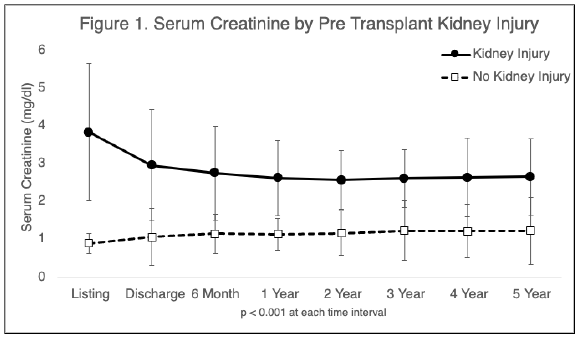Long-Term Implication of Kidney Injury Prior to Liver Transplantation for Acute Liver Failure
1Division of Transplant, Department of Surgery, University of Nebraska Medical Center, Omaha, NE, 2Division of Transplant Surgery, Massachusetts General Hospital, Boston, MA, 3University of Nebraska Medical Center, Omaha, NE
Meeting: 2022 American Transplant Congress
Abstract number: 1084
Keywords: Kidney/liver transplantation, Liver transplantation, Renal dysfunction
Topic: Clinical Science » Liver » 52 - Liver: Kidney Issues in Liver Transplantation
Session Information
Session Name: Liver: Kidney Issues in Liver Transplantation
Session Type: Poster Abstract
Date: Sunday, June 5, 2022
Session Time: 7:00pm-8:00pm
 Presentation Time: 7:00pm-8:00pm
Presentation Time: 7:00pm-8:00pm
Location: Hynes Halls C & D
*Purpose: Acute liver failure (ALF) is a heterogeneous disease process that often includes acute kidney injury. Long-term sequelae of kidney impairment in patients with ALF undergoing liver transplantation (LT), remains poorly characterized in the literature. We hypothesized that patients with ALF and concomitant kidney impairment that undergo (LT), will have persistent post-transplant kidney dysfunction.
*Methods: Analysis of the U.S. Scientific Registry of Transplant Recipients database was conducted to identify patients with ALF who received a LT between 2002 to 2020. Primary and secondary diagnosis codes were used to identify patients with ALF (fulminant hepatitis, acute hepatic necrosis, and acute alcoholic hepatitis). Pediatric patients, those with prior liver or kidney transplant, or recipients of living donor LT were excluded from the analysis. Patients were grouped as those with kidney injury (KI) if they either received dialysis in the week prior to LT or if serum creatinine was > 1.5 mg/dl immediately prior to LT. Long-term kidney function as measured by serum creatinine was the primary outcome, secondary outcome included listing for subsequent kidney transplantation (KT).
*Results: A total of 4012 patients underwent LT for ALF during the study period. Of these, 1905 (47.5%) had KI prior to LT. Serum creatinine (mg/dl) at the time of LT was higher in patients with KI versus those without (3.65 vs 0.94, p<0.001). Patients with pre-transplant KI not only experienced higher serum creatinine at time of hospital discharge after LT, but also during the 5-year follow-up after LT (Figure 1, p< 0.001). Patients in the KI group were significantly more likely to be subsequently listed for KT (6.5 vs 3.0%, p<0.001). Amongst patients listed for KT, those in the KI group had a shorter median time from LT to listing for KT (median 0.83 years (0.46-2.2 IQR) versus 3.54 years (1.1-6.7 IQR), p< 0.001).
*Conclusions: We report a high rate of KI amongst patients undergoing LT for ALF. A robust association with long-term kidney dysfunction was identified in this cohort. This was manifested, in part, by a higher rate of subsequent listing for KT and shorter interval from LT to listing for KT in patients exhibiting KI prior to LT for ALF.
To cite this abstract in AMA style:
Cloonan MR, Cloonan DJ, Westphal S, Dageforde LA, Merani S. Long-Term Implication of Kidney Injury Prior to Liver Transplantation for Acute Liver Failure [abstract]. Am J Transplant. 2022; 22 (suppl 3). https://atcmeetingabstracts.com/abstract/long-term-implication-of-kidney-injury-prior-to-liver-transplantation-for-acute-liver-failure/. Accessed March 3, 2026.« Back to 2022 American Transplant Congress

